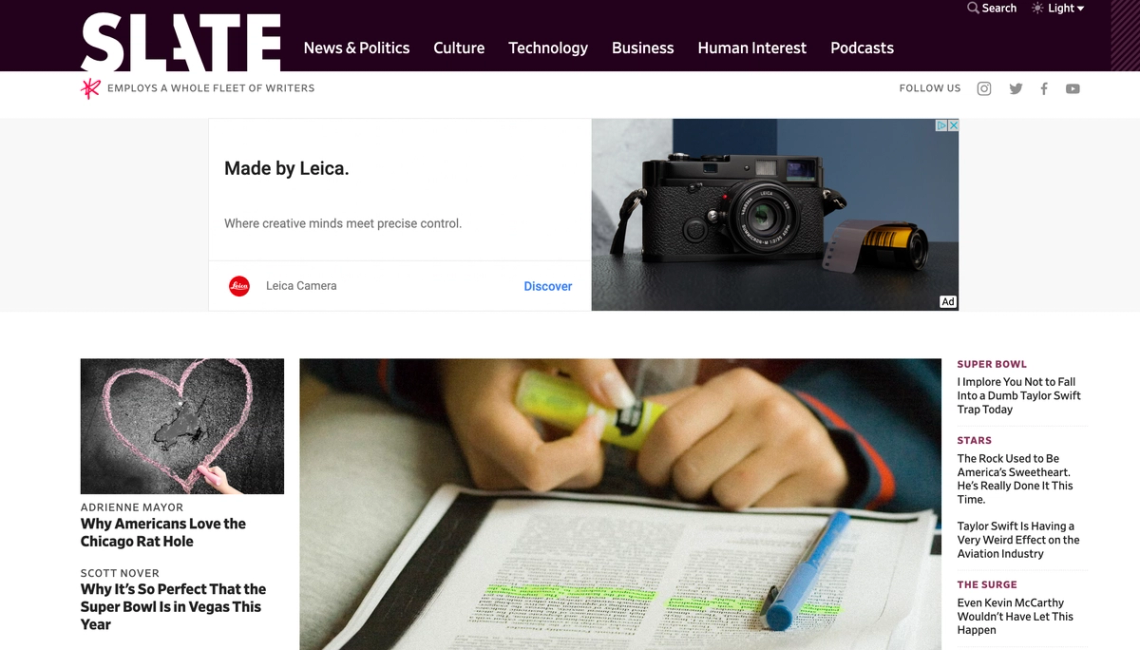 REUTERS/Wolfgang Rattay REUTERS/Wolfgang Rattay⁛ NewsInside story: The biggest scoop of the year, perhaps the decade, was the German nonprofit Correctiv’s revelation that officials of the right-wing German AfD party attended a meeting in Potsdam where a plan to deport millions of foreign-born Germans was discussed. And the inside scoop of that scoop is itself a movie-worthy tale. Tipped off about the meeting, Correctiv deployed more than a dozen staff to stake it out, scrambling to secure a room in the booked-out hotel they were gathering at to sneak an undercover reporter into the building. The reporter they sent in roamed the halls with an empty mug, waving it around as a pretext to wander in and out of closed meeting rooms in search of an elusive cup of coffee. Meanwhile, he was recording video and photos through his wristwatch. Outside, Correctiv rented a sauna raft (basically, a floating sauna) to shoot photos through the windows of the riverside hotel, stocking it with ersatz revelers to allay suspicions. And ahead of publication, Correctiv tapped its deep relationships with newspapers across the country to ensure they had access to local angles to follow up on. The effort paid off: the story has sparked unprecedented, continuing protests across Germany, with hundreds of thousands marching against the AfD in cities small and large. For Correctiv founder and Managing Director David Schraven, this is the most consequential story the newsroom has worked on. “We’ve been training for ten years,” he told Semafor, using a soccer analogy. “Now we are on the pitch.” — Gina Chua
Editor’s note: The item has been updated with new details from Correctiv. Behind the grim numbers: The number of journalists killed in Gaza — 85 — is without modern precedent. The Washington Post’s moving profiles of each one offers a glimpse behind the wartime shouting matches that often overtake conversations about death. In some cases, the Post carries the photographs and videos they shot just before they died, like this one by Roshi Sarraj, standing in the middle of the rubble in Gaza as he covers the aftermath of Israelis strikes. He posted this photo online on Oct. 17.  Ain Media Ain MediaThere’s a prize for that: One of the most compelling recent developments in global journalism has been the kind of open-source, painstaking, image-heavy investigations pioneered by Bellingcat and executed at a very high level by the New York Times and others. The emerging field now has a prize of its own, the Open Source Film Awards, presented by the U.K. based Center for Information Resilience, which is looking for “films that have added to the deeper understanding of specific conflicts, expose human rights abuses, films that uncover key elements of accountability or that challenge an established narrative of events. Finding creative ways to tell OSINV stories in an emotionally engaging way is a plus.” Shrinkage: CNN is quietly laying off staff in what has been described to Semafor as a “drip-drip-drip” approach. In addition to cuts to the morning show, the network has also “restructured” its morning its network booking department, and could continue to make cuts on a rolling basis. NewsNation trolled CNN over cuts. In a LinkedIn post, the cable news network called on CNN staff to apply for jobs at the network, noting that it was hiring for numerous new roles. La Mananera: Mexican President Andrés Manuel López Obrador has come to dominate Mexican media with his daily 7:00 a.m. press conference, la mañanera, which he’s been using to attack Pro Publica’s Tim Golden for exposing ties between drug cartels and his first campaign. He refused to speak to the outlet for the story, and has instead been trying to get Golden onto his turf. The response: “ProPublica has requested an interview with López Obrador about the story and the questions it raises, and we would speak with him as we would any other head of state — not for an episode of the regular mañanera segment he calls ‘Who’s Who in the Lies?’” ✦ MarketingDept. of Celebrification: The big new trend in TV advertising is just to pack in the celebrities, Adweek’s Robert Klara notes: “If viewers become inured to, say, 10 famous faces in a single ad, does that mean that following year’s ad needs 12 faces? 15? When does it all become too much?”  BMW, Kia BMW, KiaInternal combustion: There will only be two electric vehicle ads in the Super Bowl broadcast today, down from a peak of six and reflecting a slump in sales. Origin story: This year’s Super Bowl ad controversy comes right on time: A TikTok creator claims that a Cetaphil spot stole her idea. ✰ HollywoodDoc bust: The documentary boom has turned into a terrifying bust, and “the mood among many of the genre’s producers and directors heading into [Sundance] was pessimistic, bordering on funereal,” The Ankler’s Peter Kiefer writes. The days of nine-figure deals appear to be done as the streaming wars abate. ⁜ TechXed out: Meta’s Threads does not, in fact, want to be Twitter: “While users will still be allowed to follow accounts that post about political and social issues, accounts posting such content will not be recommended and content posted by nonpolitical accounts that is political in nature or includes social commentary also won’t be recommended,” the Washington Post writes. The left-leaning twitterati who found refuge on the new platform are understandably frustrated. Local bots: Local news was in catastrophic trouble well before AI came along. Steven Waldman has a mostly gloomy summary of how the new tech could play out locally, where there’s nobody to police the deepfakes. ⁋ Publishing Screenshot via Slate Screenshot via SlateSlated: Amid a difficult year for news media last year, Slate pulled off most profitable year in the its 27 year history. Slate’s revenue grew 28% year-over-year through a series of investments and growth in its core businesses, which revolve around its podcasts and website, executives there said. Slate’s chief executive officer Dan Check and chief revenue officer and president Charlie Kammerer said that they were a bit hesitant to celebrate their record-setting year due to the gloomy state of digital news media.But they also said the company’s leadership was proud of their strategy. By focusing on its podcasts and website, Slate was able weather an otherwise dark media business climate and continue to grow. “I feel a little lucky,” Kammerer said. “I’ve been in the business of news for a long time and you have to get a little lucky.” Sherwood staffs up: Sherwood, the media arm of the retail trading platform, Robinhood has poached a half-dozen high profile journalists to lead its Spring launch. Walter Hickey, the Business Insider data guru who won a Pulitzer for his role in a graphic novel-style treatment of the oppression of Uyghurs, who will be executive editor of the the new venture, and joined by Axios’ Matt Phillips; the former Vox data journalist Rani Molla; Jack Raines, who is leaving the Exec Sum newsletter; and the former Gawker and Outline chief Leah Finnegan, who will be features and magazine editor. Sam Ro, who will keep running his own TKer substack, one of our favorites, will also be a consulting editor on the project. They’re joining a team of about a dozen working on the Snacks newsletter and Chartr data product. “These editors and writers are wildly creative and deeply experienced, and are not only defining the voice of our news experience, but actively working to move journalistic storytelling forward in ways that really matter,” said Sherwood president and EIC Josh Topolsky. Condé moves out. The Times of London marks the end of an era with Condé Nast moving out of Vogue House in Mayfair and ” into a new HQ on the distinctly less chic Strand,” just as British Vogue editor Edward Enninful departs after losing a power struggle with Anna Wintour. The Times also explores sale rumors, and writes that Jonathan Newhouse is “potentially open to offers,” while his cousin Steven, who runs the company from New York, wants to hold on. Among potential bidders: “Saudi Arabia and United Arab Emirates-backed funds are circling.” What happened at The Messenger: Ex-messenger Political editor Darren Samuelsohn invited Ben on his love, journalism podcast last week along with Messenger traffic guru Neetzan Zimmerman, who tried to explain what — to his mind — had gone right: The Messenger built, he said, significant traffic in the post-Facebook era, which some public measures validated. Zimmerman cited Apple News as the sort of platform where The Messenger got traffic — but a former Messenger staffer with access to the data later told us that the traffic workhorses were in fact syndication deals with the lower-profile SmartNews and Newsbreak. Zimmerman also said he’d had a plan to make money off traffic by working with creators, rather than selling ads, that management had ignored. Still hard to see how you pay bills amounting to about $5 million a month that way. ♛ Victory LapIt wasn’t just Reed’s Medium interview. None of our colleagues could stay away from the media beat this week, leading to a remarkably scoopy and enlightening week here at Semafor. |










